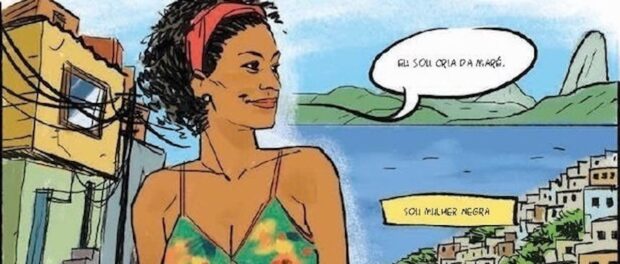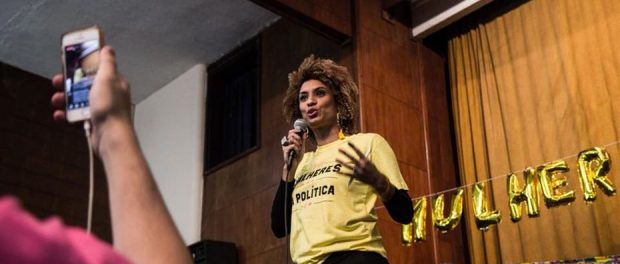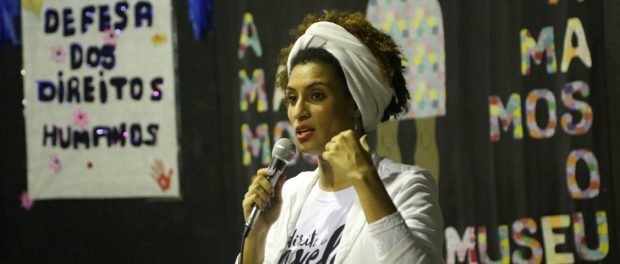
The first time that I saw Marielle Franco in the streets of Maré, in Rio’s North Zone, was in 2016. I remember her colorful head wrap vividly. She was sitting on a barstool on a Saturday alongside favela community journalists, activists, and university students. The discussion circle was about gender, race, and youth in Morro do Timbau, one of Maré’s favelas.
Marielle’s voice was firm but she also communicated through her body language. She stimulated conversations alongside current federal representative Marcelo Freixo and state representative Renata Souza. After that event, I began to follow her work in the streets, in politics, and on social media more closely.
This article is a reflection on her struggle and the impact that she had on so many people’s lives. I identify with her not only because we were born and raised in the same favela, because we had friends in common, or because we both gained access to higher education as scholarship recipients. It was much more than this. In a short time, I learned so much from her.
1) I Learned That Representation Matters
The poor gained a significant space for defending human rights when Marielle Franco was elected as a Rio de Janeiro city councilor. It was the first time that I felt completely satisfied with my vote. Over 46,000 people felt the same way. Marielle became a voice that uplifted her own: the poor, the black community, the LGBT community, favela residents. She represented people because she knew how to listen. Her efforts at inclusion were atypical. This attitude changed us; it made us part of her struggle.
2) I Learned That Entering Politics Is a Courageous Act
Marielle Franco carried on despite fear and the challenges at hand. She showed, in practice, that it is possible to be the change that we wish to see—whether through occupying the streets to demand rights or occupying the university, even with revolutionary ideas, and most importantly, by participating in actions capable of positively impacting the lives of people in need of support who share in the same struggle. In less than two years in office, Marielle passed five bills in the Rio de Janeiro City Council. Hers was a short life that unexpectedly captivated the world, albeit in a way that is difficult to come to terms with.
3) I Learned That Defending Human Rights Mobilizes People
She motivated other people to work together to make each action worthwhile. She put this idea in practice, organizing the First Right to the Favela + Communication and Culture Turn at the Maré Museum. It was a very important event for the city. Discussions were held and public policies were formulated with the participation of favela residents in workshops that went on until dawn. The space didn’t have the capacity for 46,000 people but at the polls, she had already managed to bring them together and transform their support into political power.
4) I Learned That Receiving Physical and Moral Support Makes a Difference
She defined her goals because she knew what she wanted to achieve. She was present at the inauguration of the Socialism and Liberty Party (PSOL) Maré Nucleus and at discussions held at spaces dedicated to education, memory, and culture in the favela. Her own candidacy incited the momentum for others with similar aspirations. An important example is Renata Souza, Marielle’s friend and neighbor from Maré, who ran and was elected as a state representative and president of the Human Rights Commission in the Rio de Janeiro State Legislative Assembly (ALERJ). It was necessary to give continuity to Marielle’s agenda and proposals.
For me, Marielle meant learning. She was a role model for residents of Complexo da Maré, the Rio periphery where she was born and raised, and for people from across the city who identified with the causes that she supported. With the global repercussion of her assassination—today, March 14, 2019 marks the one year anniversary—she has also taught the world what’s worth fighting for.
Community journalist Thaís Cavalcante was born and raised in Nova Holanda, one of Maré’s favelas. While working as a community communicator in Maré, she decided to study journalism in college and believes in the power of information to change the local reality for the better.


